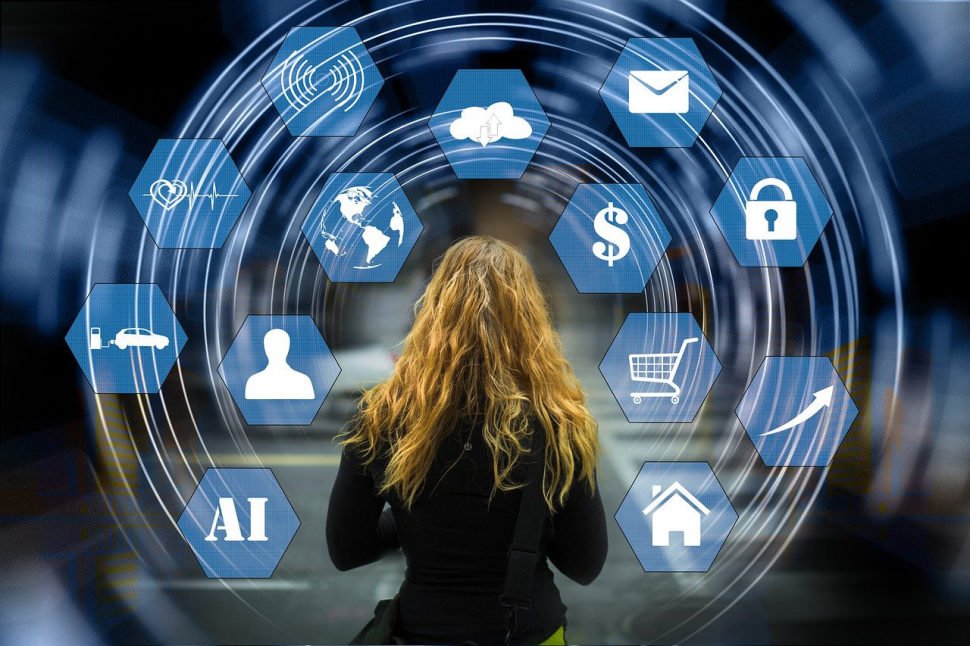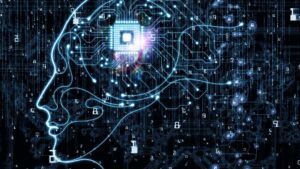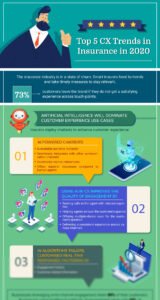AI is prevalent in our daily lives, making tasks easier and providing personalized recommendations. Examples include facial recognition and voice assistants in smartphones, personalized social media feeds, navigation apps with real-time traffic updates, AI-based healthcare, intelligent non-playable characters in video games, and automating repetitive tasks.
AI simplifies decision-making and improves our lives by enabling better choices.
Examples Of Ai In Smartphones
In today’s digital age, smartphones have become an essential part of our lives, and artificial intelligence (AI) plays a significant role in enhancing our smartphone experiences. Whether it’s through facial recognition, voice assistants, or predictive text, AI-powered features are incorporated into our smartphones to make them more intelligent and user-friendly.
Facial Recognition
Facial recognition is a remarkable example of AI in smartphones. This technology utilizes advanced AI algorithms to analyze and identify human faces accurately. By scanning facial features and mapping unique identifiers, smartphones can unlock with a simple glance or ensure secure authentication for applications and payments.
Voice Assistants
Voice assistants like Siri, Google Assistant, and Bixby are AI-powered features that have revolutionized the way we interact with our smartphones. These virtual assistants use natural language processing algorithms to understand voice commands, answer questions, perform tasks, and even engage in conversations with users. Voice assistants make our lives easier by providing hands-free assistance and access to information, all with just a few spoken words.
Predictive Text
Thanks to AI, smartphones are now capable of predicting what we are going to type even before we finish typing the words. Predictive text algorithms analyze our typing patterns, commonly used phrases, and contextual cues to suggest and autocorrect words in real-time. This not only saves time but also improves accuracy while texting and reduces the likelihood of errors.

Credit: www.forbes.com
Ai In Daily Life
Artificial Intelligence (AI) is revolutionizing the way we live, and it is now a part of our everyday lives. From personalized social media feeds to real-time traffic updates, AI is making our lives easier and more efficient. In this article, we will explore some examples of AI in our daily lives and how it is changing the way we interact with technology.
Personalized Social Media Feeds And Content Recommendations
Social media platforms are leveraging AI algorithms to enhance user experiences. Through AI-powered algorithms, social media platforms analyze user preferences, behavior, and engagement patterns to create personalized feeds. These tailored feeds ensure that users are presented with content that aligns with their interests, increasing user engagement and satisfaction. AI also recommends relevant content to users based on their previous interactions, making it easier for users to discover new and interesting content.
Product Recommendations And Personalized Shopping Experiences
AI plays a significant role in our shopping experiences by providing product recommendations and personalization. E-commerce platforms use AI algorithms to analyze user data such as purchase history, browsing habits, and preferences to suggest relevant products. These recommendations enhance the overall shopping experience by saving time and helping users discover products they may have overlooked. AI-powered personalization also allows websites to display tailored content, such as special offers or discounts, based on individual user preferences.
Real-time Traffic Updates And Navigation Suggestions
Navigation apps like Google Maps and Waze utilize AI to provide real-time traffic updates and navigation suggestions. By analyzing data from various sources such as GPS, road sensors, and user reports, AI algorithms can accurately predict traffic patterns and offer alternative routes to avoid congestion. These real-time updates and suggestions help users save time and make informed decisions about their travel routes.
Healthcare Applications
AI is transforming the healthcare industry by enabling more accurate diagnostics, personalized treatment plans, and remote patient monitoring. Machine learning algorithms can analyze vast amounts of medical data, including patient records, clinical trials, and research papers, to assist healthcare professionals in making informed decisions. AI-powered chatbots also provide instant access to medical information and guidance, ensuring prompt and accurate responses to patient queries.
Ai In Video Games
In the world of gaming, AI plays a crucial role in creating immersive experiences. Game developers use AI algorithms to design intelligent non-playable characters (NPCs) that exhibit human-like behaviors and respond dynamically to player actions. AI also generates automated game content, such as procedural level generation, ensuring a never-ending supply of challenging gameplay. These advancements in AI enhance the overall gaming experience and make games more engaging and realistic.
How Ai Makes Our Lives Easier
Artificial Intelligence (AI) is increasingly prevalent in our daily lives, making tasks easier and more efficient. Examples include facial recognition and voice assistants in smartphones, personalized social media feeds, product recommendations in online shopping, real-time traffic updates in navigation apps, healthcare diagnosis and monitoring, intelligent characters in video games, and automated decision-making.
AI streamlines workflows, offers personalized assistance, and improves decision-making, ultimately enhancing our everyday experiences.
Automation Of Repetitive Tasks
AI has revolutionized the way we handle repetitive tasks, making our lives much easier. Through automation, AI-powered systems can take over monotonous and time-consuming activities, allowing us to focus on more important tasks. Whether it’s sorting through emails, data entry, or scheduling appointments, AI takes care of these mundane tasks with speed and accuracy, freeing up our valuable time for more productive activities.Personalized Recommendations
AI algorithms have the ability to analyze vast amounts of data about our behaviors, preferences, and interests. This enables them to provide personalized recommendations that cater specifically to our needs. From recommending movies, music, and books to suggesting new products or services, AI enhances our lives by offering suggestions that align with our unique tastes and preferences. Whether it’s finding the perfect restaurant for a special occasion or discovering new content to enjoy, AI ensures that we receive tailored recommendations that save us time and enhance our overall experience.Improved Decision-making
AI plays a crucial role in improving decision-making processes, ensuring that we make informed choices. By analyzing and interpreting massive amounts of data, AI systems can provide insights, predictions, and recommendations that help us make better decisions. From financial planning and investment strategies to healthcare diagnosis and treatment plans, AI empowers us with valuable information that increases the likelihood of successful outcomes. With AI’s assistance, we can confidently navigate complex decisions, saving both time and effort. In conclusion, AI makes our lives easier by automating repetitive tasks, providing personalized recommendations, and enabling us to make better decisions. Whether it’s streamlining daily responsibilities, enhancing our shopping experiences, or improving the accuracy of our choices, AI technology has become an indispensable part of our everyday lives. Embracing the benefits of AI allows us to optimize our time, seek out personalized experiences, and make more informed decisions.Frequently Asked Questions Of 8 Examples Of Artificial Intelligence In Our Everyday Lives
What Are Some Examples Of Ai That We Use Everyday?
AI is used in smartphones for facial recognition, voice assistants, and predictive text. It’s used in social media to personalize feeds and recommend content. AI powers product recommendations and personalized shopping experiences. It’s used in navigation apps for real-time traffic updates and route suggestions.
AI is also used in healthcare for diagnosing diseases, treatment planning, and patient monitoring. Additionally, AI is used in video games to create intelligent non-playable characters and generate game content. These examples of AI make our lives easier by automating tasks, providing recommendations, and enabling better decision-making.
What Are The 4 Powerful Examples Of Artificial Intelligence?
AI is used in smartphones for features like facial recognition and voice assistants. It personalizes social media feeds and provides product recommendations while shopping. It provides real-time traffic updates in navigation apps. AI is used in healthcare for diagnosing diseases and creating treatment plans.
AI in video games generates intelligent non-playable characters and automated game content.
What Is 1 Example Of Artificial Intelligence?
Artificial Intelligence (AI) is prevalent in our daily lives in various ways. Examples include facial recognition and voice assistants in smartphones, personalized social media feeds, product recommendations and personalized shopping experiences, real-time traffic updates and suggested routes in navigation apps, AI-assisted healthcare for diagnosis and treatment plans, intelligent non-playable characters and automated game content in video games.
AI makes our lives easier by automating tasks, providing personalized recommendations, and enabling better decision-making.
What Are Some Real Life Examples Of General Ai?
AI is used in smartphones for facial recognition, voice assistants, and predictive text. Social media feeds are personalized with AI algorithms. AI provides product recommendations and personalized shopping experiences. Navigation apps use AI for traffic updates and route suggestions. AI is used in healthcare for disease diagnosis and treatment plans.
In video games, AI creates intelligent non-playable characters and automated game content. AI automates tasks, offers recommendations, and helps in decision-making to make our lives easier.
Conclusion
Artificial Intelligence (AI) has become an integral part of our everyday lives, revolutionizing how we interact with technology. From facial recognition in smartphones to personalized recommendations on social media, AI enhances our daily experiences. It streamlines tasks, provides real-time updates, and even assists in healthcare diagnosis.
By automating repetitive tasks, AI allows us to focus on more meaningful activities and make better-informed decisions. As AI continues to advance, it will continue to simplify our lives and bring new possibilities to the forefront. Embracing AI in our everyday lives is not just a choice, but a necessity for staying ahead in this rapidly evolving world.





